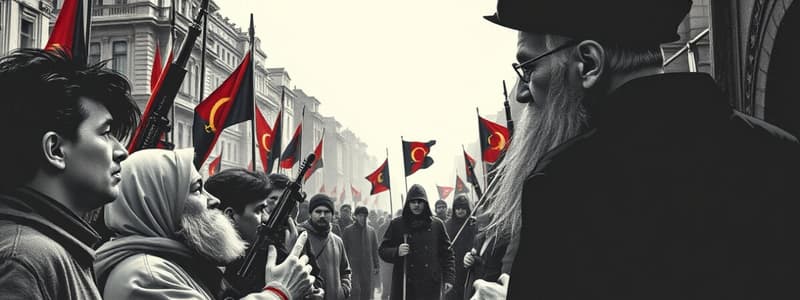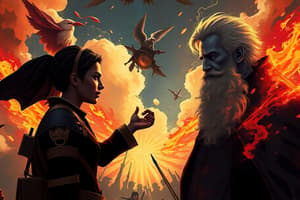Podcast
Questions and Answers
What are the two main class groups in Marx's conflict theory?
What are the two main class groups in Marx's conflict theory?
Bourgeoisie and proletariat
How does Marx's conflict theory describe the relationship between the bourgeoisie and the proletariat?
How does Marx's conflict theory describe the relationship between the bourgeoisie and the proletariat?
Mutualistic but coercive
What role do ideologies play in supporting the class system according to Marx?
What role do ideologies play in supporting the class system according to Marx?
They perpetuate and support the class system
What is false consciousness?
What is false consciousness?
What is class consciousness?
What is class consciousness?
What do unions represent in terms of class struggle?
What do unions represent in terms of class struggle?
What are the three primary bases of power identified by Weber?
What are the three primary bases of power identified by Weber?
How many classes does Weber define compared to Marx?
How many classes does Weber define compared to Marx?
Flashcards are hidden until you start studying
Study Notes
Marx's Conflict Theory
- Conflict theory centers on the struggle for power between two main classes: the bourgeoisie (capitalists) and the proletariat (workers).
- The bourgeoisie owns the means of production while the proletariat sells their labor to survive.
- The relationship between classes is characterized as mutualistic yet coercive, with capitalists needing workers and vice versa.
- The power dynamic favors capitalists, who can exploit job competition leading to low wages and poor working conditions.
Importance of Ideology in Class Systems
- Ideologies perpetuate class systems by promoting beliefs that justify the social order, often aligning with the dominant class's interests.
- Dominant ideologies reflect the ideas of the ruling class and include concepts like meritocracy, individualism, and equality of opportunity.
- Institutions such as family, mass media, and education play significant roles in disseminating these ideologies.
- False consciousness refers to the working class's acceptance of ideologies that ultimately harm their interests, preventing united action against capitalists.
Role of Unions in Class Struggle
- Class struggle arises from differing interests between capitalists seeking profit and workers demanding fair compensation and safe conditions.
- Class consciousness is the awareness of one's social class and its interests; it evolves from being a "class in itself" to a "class for itself".
- Unions represent the "class for itself," advocating for workers' interests by negotiating better pay, benefits, and working conditions.
- They counteract dominant ideologies and serve as organized efforts for social and economic change.
Comparison of Marx's and Weber's Theories
- Both theorists recognize economic power as a key aspect of social class, but Weber expands this to include non-economic factors.
- Weber introduces the concept of "status groups," acknowledging that social class is influenced by prestige, honor, and political power.
- While Marx simplified to two classes, Weber identifies four distinct classes:
- Large capitalists (employ large numbers of workers).
- Small capitalists (petite bourgeoisie, work alongside employees).
- Specialists (white-collar workers, technicians).
- Working class (limited to manual labor).
Weber's Theory of Social Status and Stratification
- Status groups add depth to social stratification by highlighting non-economic factors like social honor and prestige.
- Different class memberships influence individuals' life chances and societal positions beyond mere economic status.
Studying That Suits You
Use AI to generate personalized quizzes and flashcards to suit your learning preferences.




